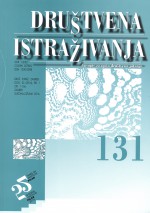Coping and Emotion Regulation Strategies in Adulthood: Specificities Regarding Age, Gender and Level of Education
Coping and Emotion Regulation Strategies in Adulthood: Specificities Regarding Age, Gender and Level of Education
Author(s): Helena Smrtnik-Vitulić, Simona ProsenSubject(s): Gender Studies, Educational Psychology, Developmental Psychology, Behaviorism, Gerontology
Published by: Institut društvenih znanosti Ivo Pilar
Keywords: coping; emotion regulation; adulthood; gender differences; education level;
Summary/Abstract: In the study, the use of coping and emotion regulation (ER) strategies is compared in 194 adults aged between 20 and 65 years, regarding their age (emerging, young or middle adulthood), gender and level of education. There are almost no significant differences in the use of coping and ER strategies in adults regarding age. Women use certain ER strategies (e.g., attentional deployment) more than men, but there is no difference between the two groups in the use of coping strategies. Adults with a low level of education use more confrontive coping and distracting in comparison with adults with a high level of education, while the escape- -avoiding coping strategy is used more by adults with low and middle levels of education than those with a high level of education. Regarding ER, adults with a low level of education use more cognitive reappraisal of importance than both groups with a higher educational level, whereas they use suppression and substances only more than adults with a high level of education. Correlations between coping and ER strategies are mostly non-significant, suggesting that coping and ER are distinct processes in adulthood.
Journal: Društvena istraživanja - Časopis za opća društvena pitanja
- Issue Year: 25/2016
- Issue No: 1
- Page Range: 43-62
- Page Count: 20
- Language: English

